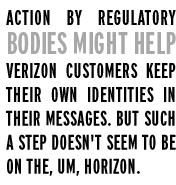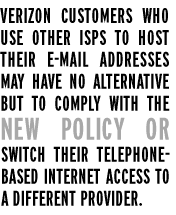| |||||||||

How Verizon put the squeeze on ISPs
 One of America's largest telephone companies has told its Internet customers they may no longer use their own e-mail accounts to send e-mail unless they include the company name in their address. One of America's largest telephone companies has told its Internet customers they may no longer use their own e-mail accounts to send e-mail unless they include the company name in their address. The move by Verizon Communications--the United States' biggest local telephone service provider, serving 31 states--is seen by observers as a way to pressure customers to use Verizon's services instead of those of smaller, independent Internet service providers. In a warning sent in July, Verizon told its 950,000 Internet access subscribers, "Effective August 8, 2001, you will no longer be able to send e-mail from any e-mail address other than the one provided by Verizon Online." Many of Verizon's Internet access users have spent thousands of dollars creating a brand identity for their own personal addresses, such as "pat@mysite.com." These customers must now use a Verizon-owned brand in their address, such as "pat@verizon.net" or "pat@bellatlantic.net." Verizon suggested a fix in its message to subscribers. "Consider one of Verizon Online's business products such as Managed Messaging, Outsourced Email, or Web hosting solutions," the company wrote. "All of these solutions will accommodate the sending and receiving of non-Verizon domain e-mails." Verizon charges $24.95 per month for its least-expensive Web hosting plan, plus a $50 setup fee and extra charges after a customer has surpassed 2 gigabytes per month of data transfers. Competing ISPs are already feeling the squeeze. "We host business sites for a couple of customers who have Verizon DSL," said Patrick Muldoon, network engineer of a small New York-based service provider called INOC. "When they called Verizon, they were told they could host with them and then they wouldn't have any of the problems."
Catherine Lewis, manager of broadband and Internet services for Verizon, said in an interview that the real purpose of the policy was not to gain new customers but to combat spam. "It's one of many steps that we're employing to control excess mail on our network, spam in particular," Lewis said. She emphasized that if customers continued using their own return addresses in their e-mail, "We will not pass it through." But anti-spam experts said requiring "verizon.net" in e-mail messages would do nothing to stop or even slow down spam. And they said Verizon itself is guilty of one of the worst spam sins: The company's Internet servers act as "open relays." Spammers use servers that are carelessly configured in this way to distribute millions of messages bearing false addresses. "They allow anybody, inside or outside their network, to send mail as long as it uses a Verizon domain," said Julian Haight, the Webmaster of Spamcop.net, a spam-fighting service. He says of the address restriction: "It's a marketing thing. I don't believe this has anything to do with stopping spam." I confirmed that Verizon servers support open relays by sending a spam message to myself. My in-box received the message with no problem. The return address did advertise the Verizon brand, though. The message was addressed to me from "test123@verizon.net"--an account name I simply made up. "Any spammer is smart enough to spoof his address," says Steve Dougherty, director of systems vendor management for EarthLink, one of the United States' largest ISPs. "We blocked our relays many moons ago." Bobbie Hennessey, Verizon's media-relations director, said of the open relays, "My understanding is that we are going to be closing them." Verizon customers who use other ISPs to host their e-mail addresses may have no alternative at this point but to comply with Verizon's new policy or switch their telephone-based Internet access to a different local provider. That may be difficult, since many independents have disappeared in the face of competition from telephone giants. Action by regulatory bodies might help Verizon customers keep their own identities in their messages. But such a step doesn't seem to be on the, um, horizon. Note: A free copy of "Windows Me Secrets" will be sent to reader Richard Biffl for sending me his tip. Brian Livingston's Wired Watchdog column appears at CNET News.com every Friday. Do you know of a problem affecting consumers? Send info to tips@BrianLivingston.com. He'll send you a book of high-tech secrets free if you're the first to submit a tip he prints. about the writer |
|
|||||||||||||||||||||||
|
Send us news tips | Contact Us | Corrections | Privacy Policy |
|

